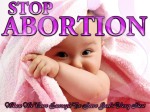 Merriam-Webster dictionary defines a “holocaust” as either “a thorough destruction of life especially with the use of fire” and/or as “a mass slaughter of people” (Merriam-Webster, www.m-w.com). The term holocaust haunts me greatly. It does so because I have had the opportunity to meet two individuals who endured the horrors of a holocaust. I had the esteemed privilege to meet some Jewish individuals who endured the horrors of Auschwitz. My heart broke for them as I heard the ruthless antics of the Nazis led by the madman Adolf Hitler. Also, I met Siv Ashley. Mrs. Ashley survived the ruthless barbarism of Pol Pot’s regime in Cambodia. As horrific as these stories are, I am met with a question in our own land. Are we guilty of a modern holocaust? This holocaust is not one in which the screams of the victims can be heard. This holocaust is occurring in every state in the United States of America. It is the holocaust of abortion. In order for abortion to be considered a holocaust of sorts, it must be asked if there is a mass killing of life going on with abortion, when does human life begin, at what point is a person considered human, and whose body is at stake when it comes to abortion.
Merriam-Webster dictionary defines a “holocaust” as either “a thorough destruction of life especially with the use of fire” and/or as “a mass slaughter of people” (Merriam-Webster, www.m-w.com). The term holocaust haunts me greatly. It does so because I have had the opportunity to meet two individuals who endured the horrors of a holocaust. I had the esteemed privilege to meet some Jewish individuals who endured the horrors of Auschwitz. My heart broke for them as I heard the ruthless antics of the Nazis led by the madman Adolf Hitler. Also, I met Siv Ashley. Mrs. Ashley survived the ruthless barbarism of Pol Pot’s regime in Cambodia. As horrific as these stories are, I am met with a question in our own land. Are we guilty of a modern holocaust? This holocaust is not one in which the screams of the victims can be heard. This holocaust is occurring in every state in the United States of America. It is the holocaust of abortion. In order for abortion to be considered a holocaust of sorts, it must be asked if there is a mass killing of life going on with abortion, when does human life begin, at what point is a person considered human, and whose body is at stake when it comes to abortion.
Does Abortion Allow for a Mass Killing of Life?
I am currently unable to report the number of abortions in 2013. The article will be updated in the event that such data becomes available. However, in 2008, it is reported that 1.21 million abortions were performed in the United States alone (Jones and Kooistra 2011, 41-50). Compare this to the 11 million people who were killed in the Nazi concentration camps, the nearly 4 million who died in the Cambodian genocide, and the 20 million who were slaughtered at the hands of Stalin. The problem with abortion is that the 1.21 million only represents one year. The overall number of deaths by abortion increases every year. Please note that I am not trying to lessen the impact of the concentration camps in Germany, Russia, or Cambodia. The numbers are used only to show the comparison between the number of deaths in these areas and the number of deaths occurring by abortion.
In my mind, a troubling statistic is found in the following: 58% of women who have abortions are in their 20s; 61% already have children; 56% are unmarried and single; 69% are economically disadvantaged; and…here is the kicker…73% report a religious affiliation (Jones and Kavanaugh 2011, 1358-1366). WHAT??? This is not occurring among the non-religious as much as the religious. This must take us in a different direction. We must answer the question about life and the body.
When Does Human Life Begin?
Some will claim that life does not begin until birth. However, the Family Research Council provides the following information:
The cardiovascular system is the first major system to function. At about 22 days after conception the child’s heart begins to circulate his own blood, unique to that of his mother’s, and his heartbeat can be detected on ultrasound ().
At just six weeks, the child’s eyes and eye lids, nose, mouth, and tongue have formed.
Electrical brain activity can be detected at six or seven weeks,(CIFS 2001, 36) and by the end of the eighth week, the child, now known scientifically as a “fetus,” has developed all of his organs and bodily structures (England 1996, 350-358).
By ten weeks after conception the child can make bodily movements (Schwarzwalder, http://www.frc.org/brochure/the-best-pro-life-arguments-for-secular-audiences).
The writers of the Bible accepted the notion that human life begins at conception. God said to Jeremiah, “Before I formed you in the womb I knew you, and before you were born I consecrated you; I have appointed you a prophet to the nations” (Jeremiah 1:5). Therefore, God knows a person before the person is born. This gives emphasis to the notion that life begins at conception, but also to the acceptance that all human beings have worth. In the Hebrew law, concessions were made for a woman who lost her child prematurely. In Exodus we read,
“If men struggle with each other and strike a woman with child so that she gives birth prematurely, yet there is no injury, he shall surely be fined as the woman’s husband may demand of him, and he shall pay as the judges decide. “But if there is any further injury, then you shall appoint as a penalty life for life, eye for eye, tooth for tooth, hand for hand, foot for foot, burn for burn, wound for wound, bruise for bruise” (Exodus 21:22-25).
The main point of the passage is found in the recognition that life begins at conception. Life was valuable even while inside the womb.
Who is Human?
Is a human a human only if they are fully developed? What about those who are not physically developed…children are not fully developed as they are not fully grown. Are they less than human? Individuals who suffer from mental illness are not fully developed mentally. Are they less than human? Well, some will argue, the fetus depends upon the mother. Does dependency make one human? In that case, young adults who still live off their parents in their 20s and 30s are not fully human in such an argument. Young adults in college would not be considered fully human since some are dependent upon mom and dad for help. What about the elderly in nursing homes? Are they no longer fully human since they depend upon others? Better yet, is there really any of us who does not depend upon someone another? The bottom line: life begins at conception. Human life has value.
Whose Body are We Debating?
Some will claim, “It’s my body. I can do with it as I please.” While this is true to an extent, the problem with abortion is found in the fact that the issue is not over the woman’s body, it is over the baby’s body. A person has no more right to kill a baby inside the womb than they do a child outside a womb, an elderly person in a nursing home, or a late blooming adult. Biology dictates how life is produced. Biology was established by God. If pregnancy is the issue, then there is a simple method to abstain from the problem…abstinence from sex outside the confines of marriage. It is like a person who claims, “I get so tempted to eat a donut when I go to Krispy Kreme.” There is a good solution to that problem. DON’T GO TO KRISPY KREME!!! The same analogy applies…don’t you think?
Here we must speak of the issue of rape. What about cases where a person is raped? It must be noted that less than 1% of all abortions occur due to rape. Finer provides the following information pertaining to the reasons for abortions:
- 25% “not ready for a(nother) child/timing is wrong”
- 23% “can’t afford a baby now”
- 19% “have completed my childbearing/have other people depending on me/children are grown”
- 8% “don’t want to be a single mother/am having relationship problems”
- 7% “don’t feel mature enough to raise a(nother) child/feel too young”
- 6% “other” (this category had no further explanation)
- 4% “would interfere with education or career plans”
- 4% “physical problem with my health”
- 3% “possible problems affecting the health of the fetus”
- -0.5% “husband or partner wants me to have an abortion”
- -0.5% “parents want me to have an abortion”
- -0.5% “don’t want people to know I had sex or got pregnant”
- -0.5% “was a victim of rape” (Finer and et al. 2005, 113-114).
Even if rape and health concerns were the reasons why people even thought about abortion, these issues would only count for less than 3.5% of all abortions that occur. The issue of rape-based abortion is steeped with emotion. However, if we are honest, we must ask, did the baby do anything wrong? Was the child guilty of wrongdoing? Would a judge condemn a teenage boy to prison over the bank robbery committed by his father? Of course not. Then why should a young baby be condemned for the heinous crime of his/her father? I am not suggesting that this is an easy issue and obviously this would require much more dialogue than what this article can bring. Yet, the question comes back to the issue, “Whose body are we debating?” In the pro-life opinion, the child is at the center of the debate and not the woman.
Conclusion: Does American Abortion Meet the Definition of a Holocaust?
If human life begins at conception, which most people would concede, then a willful taking of such life is murder. There are no two ways about it. Either abortion is murder or it is not. The only way those who promote abortion can wiggle around this fact is to claim that the life in the womb is not human. However, as we have shown, a human is human regardless of dependency, level of development, or the size of such life. The Christian understanding is that all human life holds great value. Statistics have shown that over 1.2 million abortions occur on most given years in America. Therefore, it is in my estimation that our nation is guilty of engaging in a massive holocaust. The only difference is which side of the womb the victims were located when their execution occurred. The perfect solution is not necessarily a political one, but a solution that would find a transformation of society. One that would show each person the value of every life.
Praying that America will wake up,
Pastor Brian
Bibliography
All Scripture, unless otherwise noted, comes from the New American Standard Bible: 1995 Update. LaHabra, CA: The Lockman Foundation, 1995.
England, Marjorie A. “What Is An Embryo?” in Life Before Birth, Marjorie A. England. London: Mosby-Wolfe, 1996.
Finer, Lawrence B. et al. “Reasons U.S. Women Have Abortions: Quantitative and Qualitative Perspectives.” Perspectives on Sexual and Reproductive Health 37, no. 5 (2005): 113-14.
Jones, R. K., and K. Kooistra. Abortion incidence and access to services in the United States, 2008. Perspectives on Sexual and Reproductive Health, 2011, 43(1):41–50.
Jones, R. K., and M. L. Kavanaugh. Changes in abortion rates between 2000 and 2008 and lifetime incidence of abortion. Obstetrics & Gynecology. 2011, 117(6):1358–1366.
Moore, Keith L., T. V. N. Persaud, and Mark G. Torchia, The Developing Human. Philadelphia: Elsevier Saunders, 2013.
Schwarzwalker, Rob. “The Best Pro-Life Arguments for Secular Audiences. Family Research Council. (Accessed January 6, 2014). http://www.frc.org/brochure/the-best-pro-life-arguments-for-secular-audiences.
The Commission of Inquiry into Foetal Sentience (CARE and The House of Lords). “Human Sentience Before Birth.” (2001): 3, 36.





